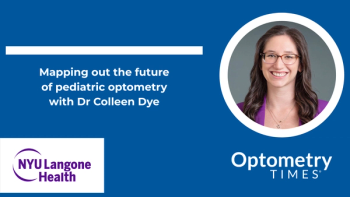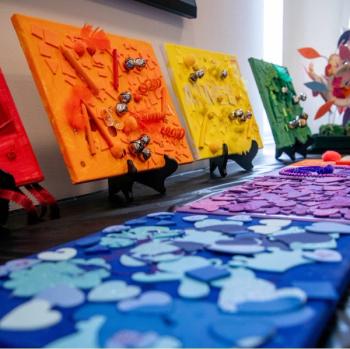
EyeCare4Kids addresses vision care for local, global communities

EyeCare4Kids founder Joseph Carbone discusses the nonprofit organization's mission to offer services in local communities, as well as its expansion into underserved communities across the globe.
Optometry Times®' Alex Delaney-Gesing speaks with Joseph Carbone, founder and president of
Since its establishment in 2001, the Utah-based organization has provided over 400,000 children with professional eye exams, vision screenings, and glasses.
In this interview, Carbone discusses the organization's mission to offer services in local communitites as well as its expansion into underserved communities across the globe.
Below is a transcript of the above interview. Editor's note: this has been lightly edited for clarity.
What is the story behind EyeCare4Kids?
Yeah, it's an amazing story, too, that's 21 years old now. I was that child growing up, that needed the services, and I was doing very poorly in school. And so years later, I have this wonderful opportunity to understand the children that we have that we serve, as well as to serve them.
I had a practice with an optometrist partner for many years in the Salt Lake Valley. And we helped many, many people for profit. And we saw the need that were there were many families that couldn't afford professional eye care. And so we did some services for free.
I volunteered at the 4th Street Clinic in downtown Salt Lake and just saw the need. We had one child come into our clinic … and it was just amazing. This was a day where you got your exam, and you came back a week later and got your glasses. And I remember distinctly, he looked out the window. And he started crying and laughing at the same time. And he said, “I didn't know trees had leaves.”
There are opportunities in life that point you in a different direction. And this was one of those. My wife and I and a friend decided to do more about it. And we started the nonprofit back in 2001, called it EyeCare4Kids. And look where it's grown. It has just been an amazing ride.
What would you say your mission is and the types of services that you offer?
We do vision screenings, comprehensive eye examinations, and (provide) eyeglasses. And I guess my mission and vision is to sight the world.
How is your organization addressing the eye care needs of underserved communities?
So we know that 1 in 4 children need eyecare. And children that come from the Upper East Side, and the well-established neighborhoods— their parents are able to afford it. But now you go to a lesser economic neighborhood, and their parents aren't able to afford it. And what we found out was that there are more children in that neighborhood.
We have brick-and-mortar clinics and also mobile clinics. So if the child can't come to us, we go to the child. We go to more rural areas, and Native American reservations.
I understand that you also outreach just beyond the local community; how did your organization start reaching out to international communities?
We started with the Native American and rural areas (in Utah), and we started going to different international places, and we partnered with different groups. And so we've been to Lao and Southeast Asia. We've been to Rwanda, we've been to South America, and Kenya (Africa).
And I'm excited to say that, at the end of this year, we're going to open our first brick-and-mortar clinic in (Ruiru), Kenya, at the Kalimoni Mission Hospital.
What is your experience been with opening in these international communities?
The people are just so wonderful; so grateful. And the need is so great. What we find outside of the United States … there may be one eyecare professional, per every 1 to 2 million people. And that's an impossibility for that eyecare professional to see that many people.
The reality is, those people are never going to have a comprehensive eye exam or a pair of glasses that's needed. And so we're trying to bridge that gap and take more services to the people.
What has been the response when you have reached out to other eyecare professionals to help with their international efforts?
That's been amazing. For instance, we work with an optometric school. And we do that with Rwanda. We work with two ophthalmologists, friends out of Las Vegas. And we work on Kenya, Africa, with them.
And so, we like to partner with other eyecare professionals in doing this good work outside of the United States. And we'd love to partner with them inside the United States. We're in Arizona, Nevada, Utah, and New Jersey, and we're looking to open up other places.
What do eyecare professionals need to know about the vision needs in other countries, aside from just the US?
Well, you just take the needs and multiply it by 1,000 or a million; the needs are that great. We love to work with other professionals. If we work with ophthalmologists, they're doing their ophthalmology services— diagnosing eye disorders, and performing cataract surgeries and other procedures.
We then go in and do the eyeglass component of that—the vision screenings, auto refractions—and then provide them with glasses. We love working with them. If other technicians or optometrists want to come with us, then we can do more diagnosing, refractions, and providing glasses.
For those interested and watching this, how can eyecare professionals get involved with EyeCare4Kids to help even more underserved communities?
One of the things we could do is, for a doctor in his or her local community, if he or she would love to, let's say donate a half a day once a month, where they could see children in their local community, we could arrange for those children to be seen by that doctor.
They’re giving back to their community, and it would really be at no cost because we would make the glasses at no charge for that child and then deliver the glasses back to the doctor's office for dispensing. So we could multiply this by 1,000 if 1,000 doctors came on to be associate members of EyeCare4Kids.
Is there anything else you'd like to touch on?
No, I have the greatest job in the world. I'm so grateful for this wonderful opportunity. Over 400,000 (pediatric patients) have been served. And our goal is to reach 1 million by the end of 2025. That's coming up really fast.
So we need all the eyecare professionals out there to come on board and assist us with this. And again, together we can “sight” the world.
Newsletter
Want more insights like this? Subscribe to Optometry Times and get clinical pearls and practice tips delivered straight to your inbox.









































